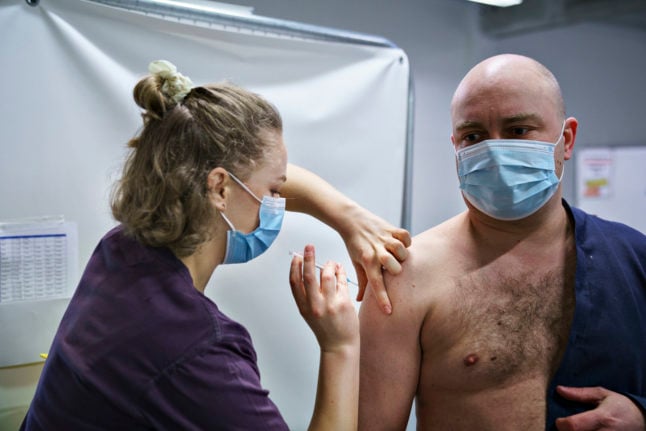Restrictions are to be eased in four phases, beginning on April 21st and reaching completion by June 26th, should everything go to plan.
The plan only applies to travel to and from countries in the EU and Schengen zone, however. That means restrictions for so-called “third countries” outside of the EU and Schengen area will follow the common approach adopted by the EU, which is expected to be renegotiated prior to the summer, according to the agreement text.
As such, people who live in the United Kingdom as well as the United States will continue to be subject to tight travel rules as Denmark lifts restrictions on European travel, despite the relatively advanced stage of vaccination programmes in both the UK and the US.
READ ALSO: Denmark announces plan to lift restrictions on travel within EU
The agreement provides for travel restrictions to be updated weekly based on local situations with the virus in individual countries and regions in the EU and Schengen area.
The four separate phases are detailed below, followed by an outline of the current joint EU policy on travel from outside the bloc. The EU rules which will remain in effect for nationals of all third countries, including the UK.
Dates are not final – health authorities will provide assessment and political parties will meet for negotiations at least one week before each new phase takes effect.
Phase 1: April 21st
- Foreign ministry to lift blanket advice against all foreign travel. Instead, three categorisations for travel recommendations: “red”, “orange” and “yellow”. The categories will reflect local infection rates as well as the presence of mutations considered a “concern” by authorities.
- Weekly updates on travel advice for individual countries to return.
- People who travel from “yellow” countries or regions not required to isolate on arrival in Denmark.
- Business travellers no longer required to isolate.
- Danes who own remote holiday homes termed ødegård in other Nordic countries no longer required to isolate.
- List of “worthy” reasons which enable non-tourist travel into the country to be extended: people attending certain types of Danish residential schools (højskoler and efterskoler), international students, spouses or partners and children of Danes who live abroad now allowed to enter Denmark (in the latter case they must be travelling together with the Danish family member).
Phase 2: May 1st
- Fully-vaccinated Danes, residents of Denmark and tourists from “yellow” and “orange” countries can travel in and out of Denmark free from testing and isolation requirements.
- Requirement to document a recent negative Covid-19 test at border changed: must now be 48 hours old or less (currently 24 hours).
Phase 3: around May 14th
- This phase will be allowed to take effect once all people in Denmark over the age of 50 have been vaccinated against Covid-19 (excluding those who choose not to take it).
- Incidence rates used in travel criteria eased: yellow and orange zones can now have up to 50 and 60 (respectively) cases per 100,000 residents in last week (currently 20/30 per 100,000).
- Yellow countries no longer require “worthy” cause for entry or isolation; normal tourists allowed to enter.
- Orange countries no longer require “worthy” cause for entry.
- Persons, including tourists, from regions bordering Denmark no longer required to isolate.
Phase 4: June 26th
- This phase will be allowed to take effect when the EU’s vaccine passport scheme has been implemented.
- The vaccine passport will provide for Danes to holiday in Europe and tourists from the EU and Schengen area to travel to Denmark for tourism.
- Test requirement remains in place for non-vaccinated people from orange countries.
- People without vaccine passports will remain subject to travel restrictions and anti-infection measures.
Source: Ministry of Justice
The above phases do not apply to people who live in the UK or any other non-EU or Schengen area country. For those countries, the joint restrictions adopted by the EU for third country travel remain in effect until the EU renegotiates or otherwise changes them.
Those rules are:
Any non-resident of the EU country (in this case, Denmark) travelling from outside the EU (including the UK) needs to demonstrate they have an essential reason for entering the country.
This allows work or study-related travel but rules out tourism, family visits or visits from second home owners. The full list of those who are allowed to travel is:
- Citizens of an EU country or non-EU citizens who are permanent residents of an EU country and need to come home
- Healthcare workers engaged in crucial work on the coronavirus crisis
- Frontier workers and in some circumstances seasonal workers
- Delivery drivers
- Diplomats, humanitarian or aid workers
- Passengers in transit
- Passengers travelling for imperative family reasons
- Persons in need of international protection or for other humanitarian reasons
- Third country nationals travelling for the purpose of study
- Highly qualified third-country workers IF their employment is essential from an economic perspective and cannot be postponed or performed abroad.



 Please whitelist us to continue reading.
Please whitelist us to continue reading.
From my understanding – according to Coronasmitte.dk – under “Worthy Purposes of Entry into Denmark” – family IS included and allowed in – even non-EU family.
“You can enter Denmark if you are the spouse, live-in partner, fiancé, sweetheart, parent, stepparent, grandparent, step-grandparent, child, stepchild, sister, brother, stepsister, stepbrother, grandchild or stepgrandchild of a Danish national resident in or permanently staying in Denmark or of a foreigner resident in Denmark.”
That does seem to be the case – I’ve just checked this as well, albeit with my translator. Hopefully my 3 month old can now meet her grandparents 🙂
Here is the Coronasmitte site in English – scroll down to worthy purpose to enter and it definitely allows parents of residents to come meet their grandchild. There are rules and protocols to do so, but they are allowed in if they follow them. Sounds like a worthy purpose indeed. Tillykke.
https://en.coronasmitte.dk/rules-and-regulations/entry-into-denmark/persons-resident-in-countries-outside-of-denmark